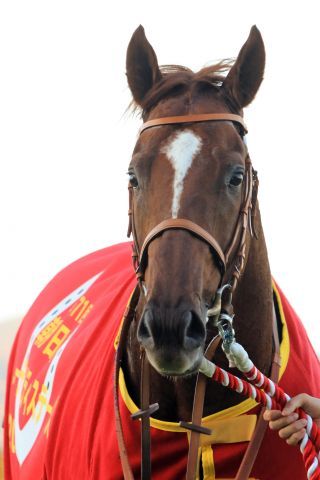Folgen
@turftimes folgen
Drucken
Redaktion
Startseite
Verwandte Artikel:
18.12.24
With the Dortmund sand track keeping the sport rolling through the winter months, now is probably a good time to take a review of the German 2024 racing year as most titles have already been decided. One title however looks like it... weiterlesen »
17.12.24
Mit der deutschen Sprachversion des Artikels zum 150-jägrigen Jubiläum der Großen Pardubitzer verabschiedet sich die osteuropäische Kolumne von Turf Times in die Winterpause.Fantome und George Sayers. An der Statue der ersten Sieger der... weiterlesen »
28.11.24
Mit dem letzten Renntag auf der Budapester All weather-Bahn am vergangenen Sonntag ging auch die ungarische Saison zu Ende. Eins von den drei besseren Rennen gewann ein in Deutschland gezogenes Pferd. Der 4-jährige Wolf of Wallstreet (Tai... weiterlesen »
28.11.24
Unfortunately we lost last Saturday's final meeting in Munich to the weather. With snow falling Thursday and temperatures staying in the minus bracket the Munich Racecourse had no other option but to cancel. It gave Munich racehorse... weiterlesen »
21.11.24
Das letzte Wochenende der polnischen Saison auf der Warschauer Rennbahn Sluzewiec stand voll im Zeichen von Maciej Janikowski, den das deutsche Publikum als Trainer des Ausnahmehengstes Va Bank (Archipenko) kennt. Der Altmeister, der 2024... weiterlesen »
19.11.24
Krefeld last Sunday ended their racing season with the Grosser Preis der Wohnstaette Krefeld formerly the Herzog von Ratibor - Rennen for 2 year olds over the 1700m (1m ½ f) trip and of Group III ... weiterlesen »
14.11.24
Eine Woche nach der Slowakei endete die Saison auch in Tschechien. Der letzte Renntag in Prag brachte viel Spannung bereits vor den Rennen, denn noch um 11 Uhr Vormittag lag dichter Nebel über der Rennbahn und es war fraglich, ob und wie... weiterlesen »
14.11.24
Even though the Turf season continues with Dresden next Wednesday and Munich on Saturday and eventually weather permitting Mulheim on December 26th really last Sundays meeting in Munich Riem brought down the curtain especially on... weiterlesen »
07.11.24
Last Saturday saw the curtain fall in Cologne, bringing to an end their 2024 Season. A nine race programme which included two amateur races had the 'Silbernes Pferd a Group 3 contest over 3000m (1m 7f) as the main attraction. Run on very... weiterlesen »
07.11.24
In Deutschland trainierte Pferde auf den ersten drei Plätzen in einem Top-Rennen in Warschau, das dürfte ein Kuriosum in der modernen Geschichte des polnischen Rennsports sein. Deutsche Starter waren sowohl vor, als auch nach der Wende auf... weiterlesen »
Termine
Thu.
26.12.
26.12.
Sun.
29.12.
29.12.
Sun.
05.01.
05.01.
Sun.
19.01.
19.01.
Sun.
02.02.
02.02.
Sun.
16.02.
16.02.
Sun.
09.03.
09.03.
Sun.
16.03.
16.03.
Sun.
30.03.
30.03.
Impressum - Datenschutzerklärung - Kontakt
©2010-2013 Dequia Media in Kooperation mit Turf-Times















